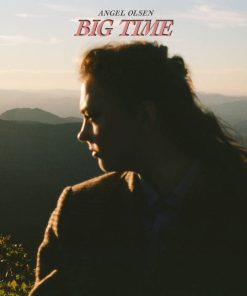Shearwater – The Great Awakening 2LP Polyborus
$ 30,98 Original price was: $ 30,98.$ 18,59Current price is: $ 18,59.
Shearwater releases it’s first album in five years, and it’s wandering frontman shows us where he’s been. In December 2016, during Shearwater’s last live show, bandleader Jonathan Meiburg picked up a slip of paper from the stage: a prayer request card, left behind by a church that had rented the Bowery Ballroom the night before. “At the time,” Meiburg recalls, “it seemed like a grim joke.” The thundering songs of 2015’s Jet Plane and Oxbo, were filled with fears for what the United States was becoming, and the recent election had confirmed them. Meiburg held the card up to the audience, asked the heavens for the swift (and natural) death of Trump and his enablers, and tore into “Hail, Mary,” the howling climax of 2006’s Palo Santo. After that, it was time to take a breath. Shearwater had recorded six LPs in ten years for Matador and Sub Pop, and toured the US and Europe many times; as the band drove home, Meiburg resolved to find a new approach. “I felt hopeless,” he admits. “And I didn’t want to make hopeless music.” For the next five years, he stretched out in all directions. First on his mind was a book-a nonfiction epic called A Most Remarkable Creature (published by Knopf in 2021), which took him to remote corners of South America in search of the strange birds of prey called caracaras and their origins in deep time. Musically he went just as wide, staging a reconstruction of David Bowie’s Berlin Trilogy for WNYC’s New Sounds, issuing a set of instrumental albums on Bandcamp, and forming a new band-Loma-with Texan producer/engineer Dan Duszynski and singer Emily Cross. Loma made two dark and dreamlike albums for Sub Pop, and their self-titled debut found an admirer in Brian Eno, who collaborated with the band on the final track of their second LP, Don’t Shy Away. And in 2020, Meiburg finally returned to Shearwater, setting up shop in a weathered RV near Duszynski’s studio to write an album that would reflect where he’d been. Above a makeshift desk, he placed a quote from TS Eliot: Be still, and wait without hope / for hope would be hope for the wrong thing. Wasn’t that also a kind of prayer? Meiburg smiles. “More like an approach I could believe in.” With Duszynski as a fellow performer and co-producer, The Great Awakening evolved through the long months of 2020 and 2021, emerging as a meditation on hope amid hopelessness, and the freedoms to be found (or dreamed about) in isolation. Several Shearwater veterans returned, including keyboardist and arranger Emily Lee and drummer Josh Halpern, but the rock gestures of Jet Plane fell away: The Great Awakening is a soulful and immersive travelog of grand atmospheres and intimate landscapes, decorated with field recordings from Meiburg’s travels and anchored by his closely-recorded voice, more otherworldly and urgent than ever. On loping lead single “Xenarthran,” he opens with a wry question-What did you expect?-then muddies the waters: the song’s hymn-like chorus circles back on itself, as if caught in an eddy, and resolves in a wash of strings and a choir of howler monkeys-evoking a world of deep shadows and tantalizing glimmers of light. The same is true of the gorgeous, enigmatic “Aqaba,” as close to a love song as Shearwater has ever made, and the superficially triumphant “Empty Orchestra” turns out, on closer inspection, to be a reckoning with nihilism’s seductive appeal. It’s an album that couldn’t have been made by any other band. It’s hard not to hear The Great Awakening as the record Shearwater’s been striving toward for years: it’s a journey into the unknown, embracing sorrow and joy, beauty and terror. In the threshing of love’s distortions and shimmerings, Meiburg sings, The stubbornest husk falls away. And the dust rises up.
Fast Shipping and Professional Packing
We offer a broad range of shipping options due to our long-running partnerships with UPS, FedEx and DHL. Our warehouse employees will pack all goods to our exacting requirements. Your items are carefully inspected and secured properly prior to shipping. We ship to thousands of customers every day from all over the world. This demonstrates our dedication to becoming the largest online retailer in the world. Warehouses and distribution centres can be located in Europe as well as the USA.
Note: Orders that contain more than one item will be assigned a processing date depending on the item.
We will carefully examine all items before sending. Today, the majority of orders will be shipped within 48 hours. The expected delivery time will be between 3 and 7 days.
Returns
Stock is dynamic. It's not completely managed by us, since we have multiple entities, including the factory and the storage. The actual inventory can fluctuate at any time. It is possible that the stocks could be depleted after your order has been processed.
Our policy lasts 30 days. If you haven't received the product within 30 days, we're not able to issue a refund or an exchange.
To be eligible for a refund the product must be unopened and in the same state as when you received it. The item must be returned in its original packaging.
Related products
Records & LPs
Records & LPs
Records & LPs
Records & LPs
Records & LPs
Records & LPs
Records & LPs
Records & LPs
Records & LPs
Records & LPs
Records & LPs
Records & LPs
Records & LPs
Records & LPs
Records & LPs
Records & LPs
Records & LPs
Records & LPs
Records & LPs
Records & LPs
Records & LPs



































